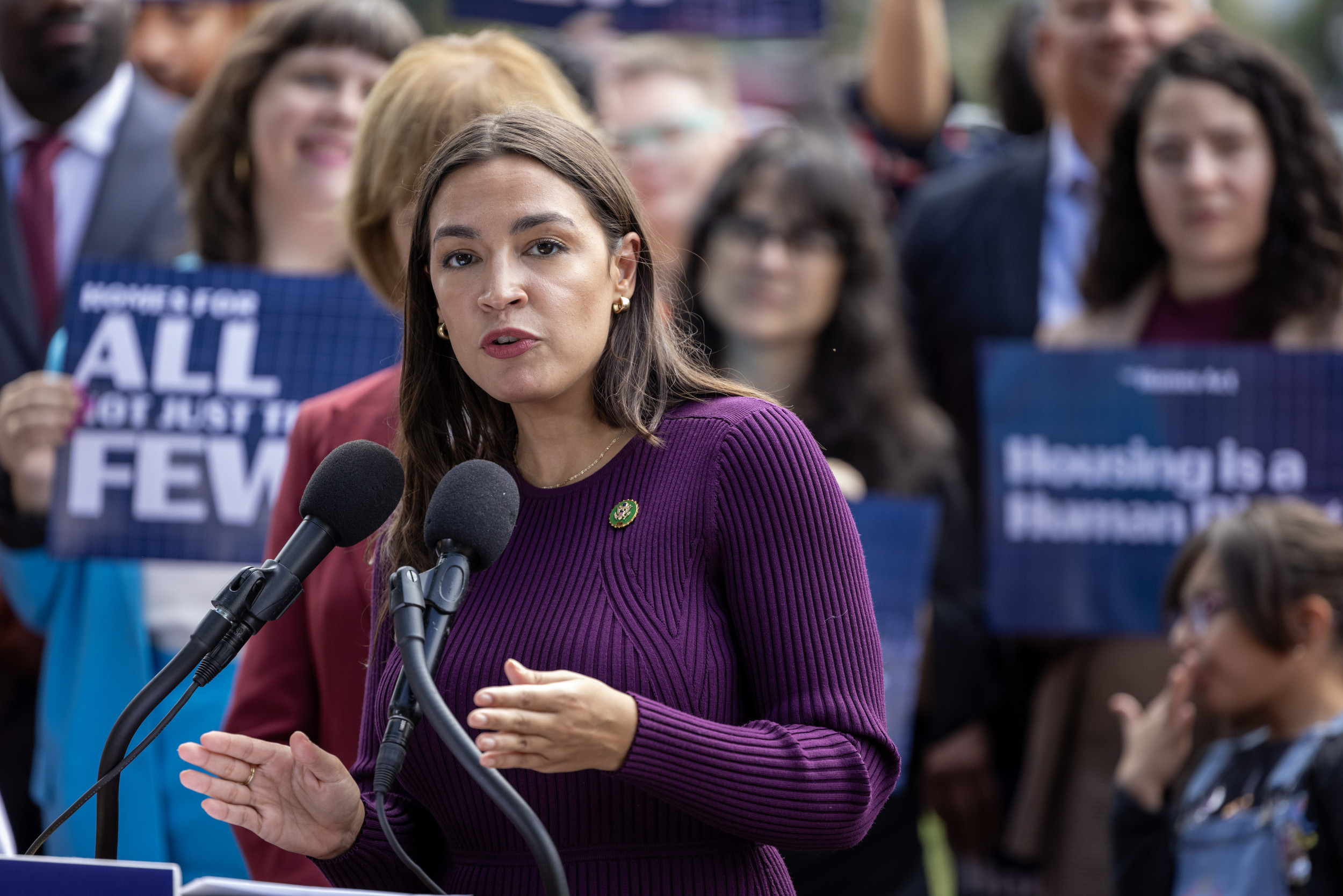Unveiled! Alexandria Ocasio-Cortez's Net Worth (2024)
Does the financial standing of a Congresswoman truly matter to the electorate? Alexandria Ocasio-Cortez's net worth has become a subject of public interest, sparking conversations about wealth, political ideologies, and the intersection of personal finances and public service. It's a question that goes beyond simple numbers, delving into the complexities of transparency, public perception, and the expectations placed upon those who represent the people.
The scrutiny surrounding Alexandria Ocasio-Cortez's (often referred to as AOC) finances is not unique to her; it's a common thread woven through the political landscape. Yet, the specifics of her situation, combined with her progressive political stance and her vocal criticism of corporate influence and wealth inequality, have amplified the interest in her personal economic status. How a politician manages their own finances inevitably shapes the narratives surrounding their policy decisions and their credibility in addressing issues of economic fairness. The narrative is particularly interesting when considering her public persona and the policies she advocates for, it is worth noting that such data is often subject to change, and relies on the information available to the public.
| Category | Details |
|---|---|
| Full Name | Alexandria Ocasio-Cortez |
| Date of Birth | October 13, 1989 |
| Place of Birth | Bronx, New York City, New York, USA |
| Education | Boston University (B.A. in Economics and International Relations) |
| Political Party | Democratic Party |
| Current Role | U.S. Representative for New York's 14th congressional district (since 2019) |
| Previous Occupations | Bartender, Educator, Organizer |
| Salary (as of 2023) | $174,000 per year (as a U.S. Representative) |
| Estimated Net Worth (as of 2024) | Ranges from $0-$2 million (highly variable based on assets and liabilities, and public disclosures) |
| Assets | Primarily dependent on investments, property (if any), and savings. Income is from salary and any other possible investments. |
| Liabilities | Student loans and debts |
| Political Positions | Progressive; Advocating for policies such as the Green New Deal, Medicare for All, and increased minimum wage |
| Website Reference | U.S. Congress Official Website |
Tracking a politician's net worth is, in many ways, a complicated exercise. The financial information available to the public often comes from various sources, including financial disclosure reports filed with the House of Representatives, which are required by law for all members of Congress. These reports provide a snapshot of assets, liabilities, and income, but they are not always perfectly comprehensive. They provide ranges rather than exact figures, and assets are valued at the time of filing. Additionally, politicians often hold assets through blind trusts or other investment vehicles, making it harder to determine the precise nature and value of their holdings. The varying nature of this information can make calculating an exact net worth a challenge.
The disclosure reports reveal a general picture of Ocasio-Cortez's financial situation. Given her age and relatively recent entry into politics, her net worth is modest compared to some of her colleagues. The reported assets usually include her salary, and any investments held. These investments, along with any liabilities such as student loan debt, contribute to the overall calculation. The value can fluctuate greatly depending on market conditions. The data that is available provides a useful basis for understanding her financial standing, her financial choices, and any potential conflicts of interest. These reports are also a testament to the requirement of transparency within the government.
The sources of her income are also relatively straightforward, primarily consisting of her Congressional salary. This is supplemented by any potential income from investments, book royalties or any other source that is required to be disclosed. Any additional income must also be declared, and it is all subject to the same transparency rules. The specifics of any investments, and the potential for income outside of her base salary, provide the public with a more comprehensive view of her financial situation. The focus on income sources highlights the importance of transparency in ensuring there are no conflicts of interest.
Comparing the financial profile of Alexandria Ocasio-Cortez to other members of Congress is a useful exercise, however, it's important to consider the context. Congress is comprised of individuals from various backgrounds, with vastly different levels of experience and wealth prior to entering politics. Some members come from affluent backgrounds, bringing with them pre-existing assets, while others, like Ocasio-Cortez, have a more modest financial history. These differences in wealth can influence political outlook and policy preferences, and this influences the types of experiences they bring to their work in Congress. Comparing their financial situations is crucial, but it is also necessary to consider the context of their careers and what they bring to the table.
The questions surrounding the financial status of Ocasio-Cortez also extend to her spending habits. Given her progressive political stance, her spending patterns can come under scrutiny as the public gauges whether her lifestyle aligns with her stated values. For instance, when reports surfaced about certain spending habits, it prompted discussions about the balance between personal choices and political messaging. These types of discussions are very important, as they help to determine the transparency of politicians, and whether they are upholding the values that they preach.
Another aspect of the conversation about AOC's net worth is the symbolic weight of wealth, and how it can be perceived by the electorate. Her advocacy for policies like increased taxes on the wealthy and a more equitable distribution of resources often puts her at odds with some of her wealthy colleagues. This dynamic underscores the inherent tension between wealth, power, and the pursuit of social justice. The very fact that someone with a smaller net worth than many of her colleagues can become so influential within the political landscape speaks volumes about her ability to connect with voters and promote her agenda. It is not uncommon for progressive politicians to find themselves in positions of power despite lacking a large net worth, which is a testament to their ability to connect with the masses.
Beyond the specifics of AOC's finances, the debate also touches upon the broader issue of wealth in politics. There is an increasing public awareness of the role of money in political campaigns and the potential influence of wealthy donors. Concerns about the influence of corporate lobbying and the concentration of wealth have fueled the debate on campaign finance reform and the need for greater transparency in political spending. In this context, the discussion of a politician's net worth is not just about personal wealth, it is also about the larger economic and political landscape in which they operate.
Furthermore, the scrutiny on Alexandria Ocasio-Cortez's net worth raises questions about ethical considerations, and potential conflicts of interest. While financial disclosure reports are designed to prevent such conflicts, the public and ethics watchdogs continue to monitor the financial activities of politicians. The potential for conflicts of interest can arise when a politician's personal finances intersect with their official duties. This can take many forms, from investments that could be affected by their legislative decisions to the acceptance of gifts or favors from individuals or organizations with an interest in their actions. The strict enforcement of ethics laws and the continued vigilance of the public are vital for ensuring that public officials act in the best interests of their constituents.
The conversation about AOC's net worth is a microcosm of the wider discussions occurring in American society about economic inequality. The increasing gap between the rich and the poor is a major source of concern, and this has fueled the desire for policies that address this disparity. The discussion of AOC's finances is thus connected to the larger conversation about wealth redistribution, social justice, and the need for more equitable economic policies. Her financial situation, and the public's perception of it, can either enhance or detract from her ability to advocate for these policies. It is important for politicians to be as transparent as possible, so that they can more easily advocate for their agenda.
As Alexandria Ocasio-Cortez continues her career in public service, her financial disclosures will remain a matter of public interest. The evolution of her net worth, and the choices she makes with her resources, will be watched closely by both supporters and critics. The way in which she handles these financial matters will shape the narrative surrounding her and have implications for her political influence. It will inform the discourse about wealth, ethics, and the role of money in politics. It is likely that the conversation surrounding her net worth, and the policies she supports, will continue to develop as she continues her tenure in Congress.
In conclusion, the focus on Alexandria Ocasio-Cortez's net worth is a multi-faceted phenomenon, one that reflects not only on her personal finances but also on the broader societal concerns about wealth, politics, and the expectations we place on our elected officials. As long as the debate around wealth, ethics, and political ideology continues, the scrutiny over her financial situation will remain and it will also be a matter of public interest. The questions surrounding her net worth are not just about numbers, but also about her role in shaping the future.



